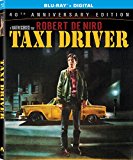| Reviews & Columns |
|
Reviews DVD TV on DVD Blu-ray 4K UHD International DVDs In Theaters Reviews by Studio Video Games Features Collector Series DVDs Easter Egg Database Interviews DVD Talk Radio Feature Articles Columns Anime Talk DVD Savant Horror DVDs The M.O.D. Squad Art House HD Talk Silent DVD
|
DVD Talk Forum |
|
|
| Resources |
|
DVD Price Search Customer Service #'s RCE Info Links |
|
Columns
|
|
|
Taxi Driver
The classic American anti-hero
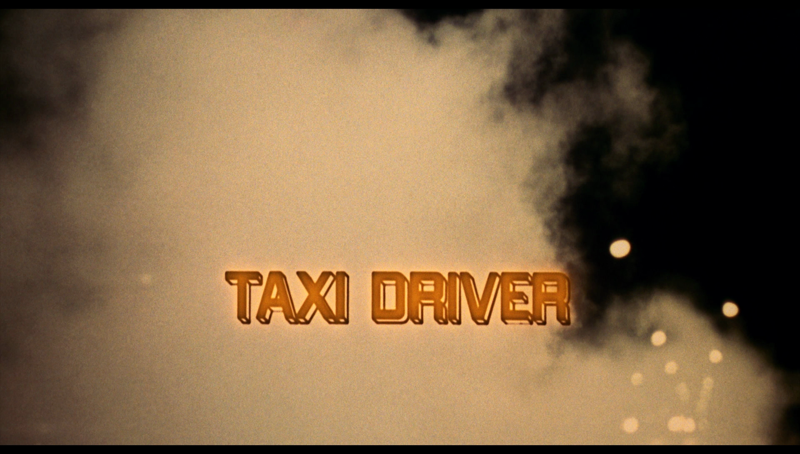
Loves: '70s cinema
Likes: Martin Scorsese, Robert De Niro, Jodie Foster
Dislikes: Crime films
Hates: Guns
The Movie
A film starring a psychopathic gunslinger with issues dealing with women, who turns to violence thanks to a fear and hatred of the "other". How could Taxi Driver possibly still be relevant 40 years later? It's truly a mystery...
Titular nutjob Travis Bickle--played with quietly seething menace by Robert De Niro--is a perfect anti-hero. His motivation is what you would consider to be mostly good, as he is against crime and wants to defend the innocent, but the problem with most such self-assigned avengers, besides the lack of proper oversight and accountability, is shoddy judgement and questionable personal guidelines. If your views and lifestyle don't perfectly align with his, you are the enemy, a point made clear as Bickle offers his laundry list of "problems" the world faces, which unsurprisingly is made up of people who look nothing like him.
Martin Scorsese's film--set in the gritty world of 1970s New York City--puts the viewer in the uncomfortable position of following along on Bickle's spiral from a disillusioned Vietnam veteran to a one-man army who hones himself into a weapon of street vengeance. How you view the journey says a lot about you, as there are likely plenty of viewers who cheer on his efforts (probably around 60 million or so), willing to ignore (or, worse, embrace) his anger and hatred because, to that audience, the ends justify the means. The film's ending even plays into that interpretation, even if that's not exactly what was intended.
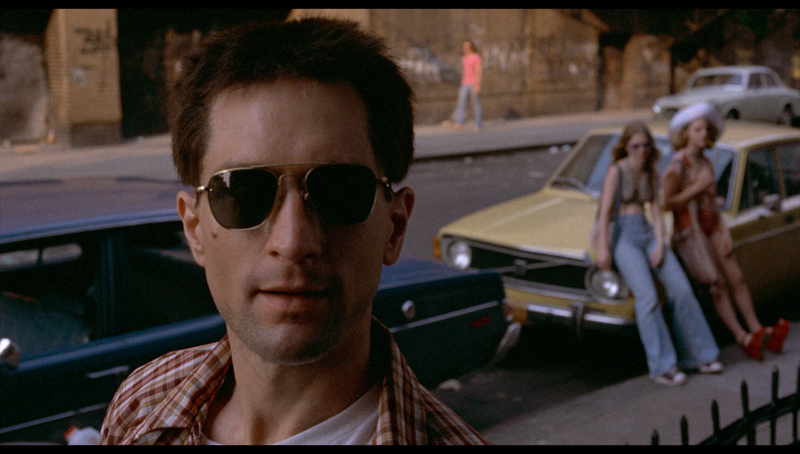
Scorsese uses a number of different techniques to create a sense of tension and anxiety as Bickle travels his lonely road, and the film is effective in showing how someone could tip over the edge and become a danger to those around them, but stops short of offering a clear explanation. Part of it is Bickle's role as narrator--as unreliable a narrator as has ever graced the screen--and the way the film presents little to no backstory for him. What we see is what we get, and everyone who crosses his path has the opportunity to become either a loosely-defined friend or an absolute foe, be it a woman who catches his eye, a fellow cabbie or a would-be president.
Part of the appeal of Bickle's unregulated id is the charm that De Niro imbues him with, obvious in his cat-and-mouse game with the Secret Service or his aggressive, iconic statement to his mirror. There's always something attractive about the anti-hero, the being who doesn't allow the rules to dictate their behavior, particularly when you agree with a portion of the results, as is the case with Bickle's quest to save 12-year-old Iris (Jodie Foster) a child being prostituted by Sport (Harvey Keitel). It's hard not to enjoy how Bickle seeks Iris' freedom, because the cause is right, even if the method is horrific. However, as you watch, if you find the film's closing moments to be anything but disturbing, you may just be another Travis Bickle.
While Scorsese and his crew--working from a smart, yet crushing screenplay from Paul Schrader--do an outstanding job of capturing a New York City where life is cheap and connections are fleeting (with Scorsese even jumping in front of the camera for a choice scene with De Niro), this is an actors film, with a number of great performances. Foster shows the incredible talent that would make her a huge star at an unbelievably young age, while Keitel manages to be both the film's most hate-worthy and amusing character at the same time. While Cybill Shepherd doesn't do a great deal of memorable work as the object of Bickle's affection (overshadowed by De Niro in most scenes), Albert Brooks and Peter Boyle both take relatively small parts and make the most of them. But in the end, the film lives and dies with De Niro, and he is more than up to the task.
While most of the film is brilliantly made--a true New York City classic--the ending feels like it sticks around a few beats too long, and runs the risk of negatively impacting everything that happened before. Every time I watch it, I think the movie is over and then it keeps going, and it's never not a disappointment. As much as Scorsese and Schrader defend it, it feels like a mistake and a small weak point in an otherwise tremendous cinematic experience.
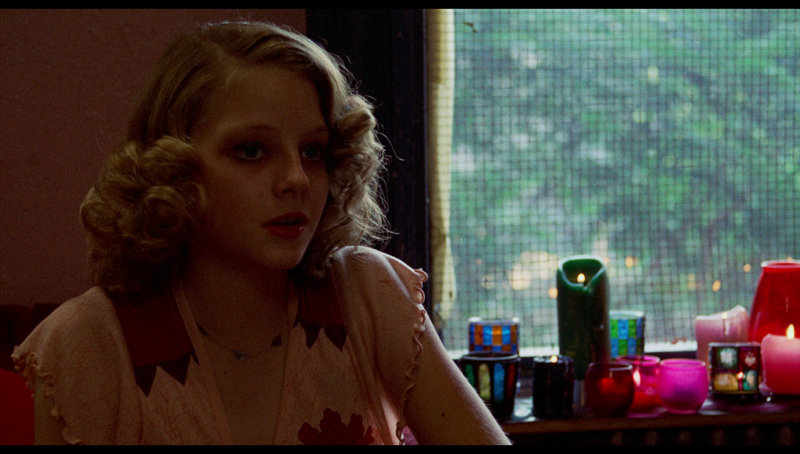
The 40th Anniversary edition of Taxi Driver arrives in a two-disc set (one Blu-ray, one DVD), packaged in a standard-width, dual-hubbed Blu-ray keepcase with a slipcover that repeats the cover art. The discs have animated menus with options to watch the film, select scenes, adjust the setup and check out the extras. Speaking of the set-up, there's a lot of options, with audio available in English 5.1 DTS-HD Master Audio, English Dolby Digital 5.1 Czech, Italian, French, Japanese, German, Polish, Hungarian, Portuguese, Spanish (Castilian and Latin American) and Russian, while subtitles are available in English. English SDH, Chinese, Czech, Danish, Dutch, Finnish, French, German, Greek, Hungarian, Italian, Japanese, Hebrew, Norwegian, Polish, Portuguese (Portugal & Brazil), Spanish (Castilian and Latin American), Swedish and Turkish (A new champion, at 22 subtitle tracks.)
The Quality
The 1.85:1, AVC-encoded 1080p transfer here isn't too far off the one released as part of Sony's "Mastered in 4K" line, with less room to roam on the disc, and thus a lower bit rate. Despite that, it looks about as good as the film could considering its age, production budget and the stock used at the time. It has a grittiness that's fitting for the film, with a strong, even layer of cinematic grain (a bit noisier during darker scenes) and an appropriate color scheme that's urban yet well-saturate during day scenes and garishly colorful at night, powered by the hues of the city streets (with the exception of the film's famous finale, which used desaturation to get around ratings issues.) Black levels are solid throughout, while the level of fine detail is very high, which helps show how impressive F/X artist Dick Smith's work was, as even the clarity of this presentation doesn't reveal his presence. Digital distractions are not a concern in this gorgeous image.
The film's 5.1 DTS-HD Master Audio track does the trick when it comes to delivering the film's signature audio element: Bernard Herrmann's final score--jazz-heavy arrangements that help raise the level of anxiety, provide an incongruous background for Bickle's madness and crafting a lurid atmosphere overall. The music is clear and powerful, getting boosts in the surrounds for proper presence. The surrounds also aid in providing a bed of environmental sound, which set the scene excellently. Dialogue is crisp and distortion free, while sound effects are distinct, though less integrated into the overall mix, seemingly sitting on top of the rest of the sound. This is a terrific sounding disc.
The Extras
Though a few extras have fallen by the wayside over the years (Laurent Bouzereau's still-gallery commentary, the original screenplay, a script reading and a script to screen comparison), there's a pile of bonus content on this set. However, there's just one new extra not found on the previous releases: a star-studded 40th anniversary Q&A session from the 2016 Tribeca Film Festival (41:56). Scorsese, De Niro, Foster, Keitel, Schrader, Sheppard and producer Michael Phillips are all on hand, as they talk about the making of the film, share some behind-the-scenes trivia and tell some fun stories about Hermann and how Keitel met Scorsese. Much of it will be heard again in the older supplements, but there's a touch more perspective here, along with the fun of seeing them all together.
A whopping three commentaries are available here, starting with a gem of a track with Scorsese and Schrader, originally recorded by the Criterion Collection (the packaging labels this as a 1986 track, but Scorsese mentions Michael Keaton's Batman, which indicates it's from 1989 or later.) The two participants were recorded separately, with moderator Deirdre O'donoghue pulling them together with her segues and introductions. Schrader touches on the addition of comedy, the toning down of Bickle's racism and the autobiographical elements, while Scorsese (who provides the bulk of the comments) discusses the influences on his work and the torture of making movies. Listening to this track will remind you of what good editing can mean to a commentary and what the art used to be.
The second commentary is courtesy of professor Robert Kolker, who approaches the film from an academic and analytical perspective, focusing on color, visual language, plot structure and the themes in the film. It might be a bit dry for casual viewers, but cinephiles will appreciate the detail in his information. Then there's a separate solo track from Schrader, recorded more recently than the Criterion commentary. Unfortunately, there's a good deal of dead air in this one, and a lot of repetition from what you've already heard (and will hear again) but he does offer some interesting observations on the film, as well as on the general idea of media and art's relationship with the criminally insane.
"Martin Scorsese on Taxi Driver" (16:54) is an opportunity to hear Scorsese talk about his film, which means you're getting mostly the same info he shared in his commentary. There are slight variations, due to the time the piece was shot, but fans will want to watch any way. It's followed by "Producing Taxi Driver" (9:53), which lets Michael Phillips talk about his history in the industry and what it was like to pull the picture together from the producer's perspective.
Though oddly not listed on the box, "Influence & Appreciation: A Martin Scorsese Tribute" (18:30) has been carried over here. Oliver Stone and Roger Corman join the party, as they share their thoughts on Scorsese and his work, along with Schrader, De Niro, Kolker, DP Michael Chapman, and Phillips. Hearing from filmmakers who learned and were inspired from watching Scorsese's film would have been welcome though.
"God's Lonely Man" (21:42) takes an in-depth look at Bickle as a character, through interviews with Schrader and Kolker. Again, you'll hear much of this in their individual commentaries, but it's a well-produced featurette, and also looks a bit at Schrader's role as writer on the film.
"Taxi Driver Stories" (22:22) is one of those fascinating featurettes that move from the film to the real world, as a group of real-life New York taxi drivers talk about their experience on the job (with some insight from former NYC mayor Ed Koch) as well as the economics of the industry, making it entertaining and informative.
Koch returns in the 6:15 "Travis' New York", a featurette on New York in the ‘70s, a place very different than the one you see today. Schrader and Chapman appear as well to talk about the look and feel of the time. In a similar vein there's "Travis' New York Location," a nine-part 4:45 then and now (or more to the point 2006) look at NYC spots seen in the film and what they looked like 30 years later.
The second disc (a DVD) holds the 70:51 Making Taxi Driver, an in-depth documentary on the film's production. The big players are all on-hand to talk about pretty much every element of the movie, from casting to improvisation to the poster. At this point, after a pile of extras, there's not a lot here you haven't heard before, but there is the addition of Dick Smith, who goes into detail on the effects work he did, and Elmer Bernstein, who talks about Hermann's musical contributions, helping ensure this is more than just a compilation of content available elsewhere on the set.
There's also 8:22 of storyboard to film comparisons, presented in splitscreen format, with a 4:33 intro from Scorsese, who talks about the importance of storyboards and the reasons he did them. The value here is seeing how Scorsese translated his vision to the screen via drawings, despite not being the world's finest artist. It's an inspiration for anyone unskilled with a pencil.
Wrapping up the extras are a set of four automatic photo galleries (Hermann's sheet music, on-set images, posters and publicity and Scorsese as director), and the film's theatrical trailer (3:10), which sells the film mainly using De Niro's presence.
Also in the package is an Ultraviolet code.
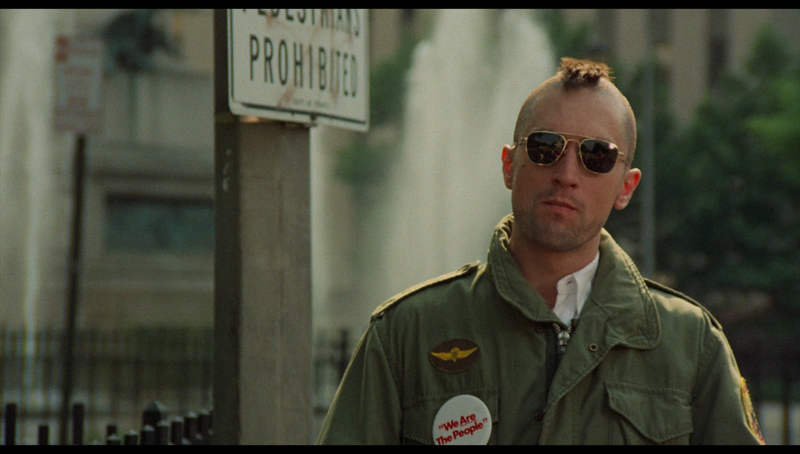
Taxi Driver is a rough, ugly, uncomfortable film, but it's wonderfully acted and beautifully constructed and, as a result, it's entrancing to watch (if you can deal with the horribleness on display.) This set rewards anyone who held off on previous releases, combining a great presentation with a wealth of bonus content, including a new 42-minute retrospective with all the film's biggest names and almost everything previously available. If you do own one of the earlier Blu-rays, stepping up to this release isn't an absolute necessity (unless it's the extra-less "Mastered in 4K" version.) If you don't own it in Blu-ray, it's a must-have.
Francis Rizzo III is a native Long Islander, where he works in academia. In his spare time, he enjoys watching hockey, writing and spending time with his wife, daughter and puppy.Follow him on Twitter
*The Reviewer's Bias section is an attempt to help readers use the review to its best effect. By knowing where the reviewer's biases lie on the film's subject matter, one can read the review with the right mindset.
|
| Popular Reviews |
| Sponsored Links |
|
|
| Sponsored Links |
|
|
| Release List | Reviews | Shop | Newsletter | Forum | DVD Giveaways | Blu-Ray | Advertise |
|
Copyright 2024 DVDTalk.com All Rights Reserved. Legal Info, Privacy Policy, Terms of Use,
Manage Preferences,
Your Privacy Choices | |||||||









